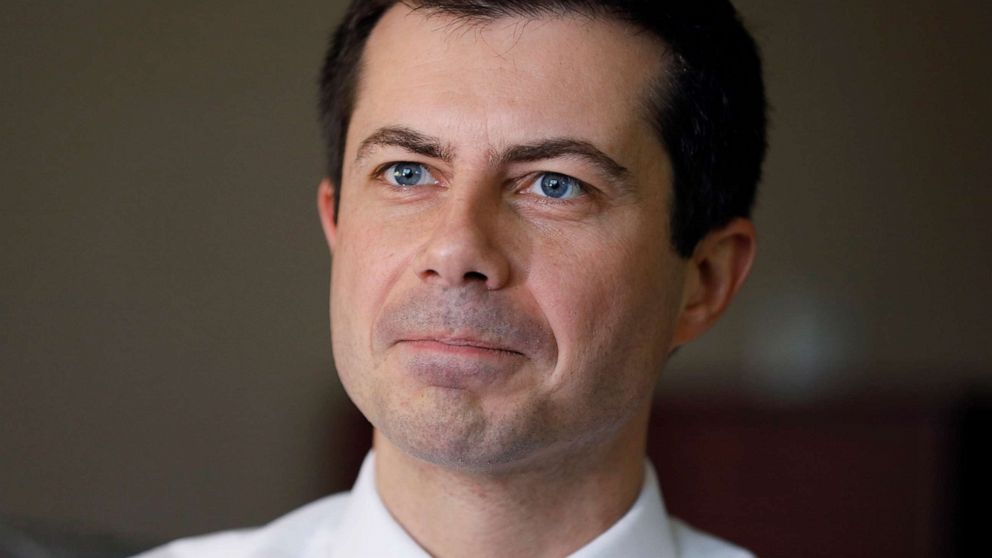[ad_1]
Former South Bend, Indiana, Mayor Pete Buttigieg will suspend his 2020 presidential campaign,
according to sources.
Buttigieg will address supporters Sunday night is his hometown of South Bend, campaign officials announced.
The suspension of the campaign will bring to a close an historic bid by the first openly gay man to seek the presidency.
Buttigieg, who was once a long-shot in a crowded field of candidates, became a household name during the Democratic primary and would eventually go one to fare well in the Iowa caucuses and New Hampshire primary before his momentum was slowed during contests in the more diverse states of Nevada and South Carolina.
When he announced his exploratory committee in January 2019, voters didn’t know him or his policy positions, and could not pronounce his last name.
“Boot Edge Edge” became a pronouncer of sorts, plastered across campaign merchandise and even adorned across an entire wall at his campaign headquarters.
At 38 years old, he was a millennial and the youngest candidate in the field. Buttigieg leaned on his youth, hoping to bring about a new generation of leadership in Washington, D.C., and ran on a message of unifying the country in a post-Donald Trump presidency.
He’d begin his town halls asking voters to visualize the day the sun comes up over America and Trump was no longer president.
“We will be even more divided and polarized on that day then we are now. Just worn out from fighting, exhausted and torn up over politics. And that means that we are going to require a president who is focused on uniting the American people, and healing what has been torn up and broken among us,” Buttigieg said during a town hall in New Hampshire in January.
Buttigieg, as the first major openly gay candidate to mount a significant run for president, campaigned alongside his husband, Chasten, who developed his own fan base along the way. In one of Buttigeig’s most powerful moments, he also became the first person from the LGBTQ community to talk openly on a presidential debate stage about his coming out.
During the ABC News/Univision hosted debate in September, Buttigieg recalled being a military officer while deployed to Afghanistan in 2014 during the era of “Don’t Ask, Don’t Tell,” while also serving as mayor in a state under then-Governor Mike Pence.
“At a certain point when it came to professional setbacks, I had to wonder whether just acknowledging who I was was going to be the ultimate career ending, professional setback. I came back from the deployment and realized you only get to live one life and I was not interested in not knowing what it was like to be in love any longer, so I just came out.”
For Buttigieg, there was no setback, but rather overwhelming support from his community. After coming out in an op-ed in his local newspaper during his 2015 reelection year, he was elected with 80% of the vote.
Buttigieg took more moderate positions than some of the other candidates in his party. Most notably, his Medicare for All Who Want It plan left private insurance in place and he opposed free college for everyone. Instead, he supported free college for those who can’t afford it.
He embraced his underdog status in the race and proved himself to be a master fundraiser, often beating out more notable names each quarter. But his fundraising also brought about a contentious spar with Sen. Elizabeth Warren at the end of 2019 over attending private events.
For much of the year, Buttigieg’s private fundraisers were closed to press and his campaign had stopped releasing names of bundlers, but after mounting pressure from reporters and Warren to open them up, he changed course in December, allowing media in and disclosed those who were raising money for his campaign.
The former mayor was constantly having to defend his experience and whether he was qualified to be commander-in-chief. His failed runs for Indiana state treasurer in 2010 and the DNC Chair in 2016 were often pointed out as being unelectable and the wrong candidate to take on Trump in a general election.
One of his biggest political shortcomings was the lack of support from African-American voters. He hovered around 2% among black Democratic voters and black Democratic-leaning independents, according a recent Washington Post/ Ipsos poll.
Some of the potential causes for his low support is the criticism he received over his relationship with black residents in South Bend and his demotion of the city’s first black police chief, Darryl Boykins, in 2012.
The shooting death of a black man, Eric Logan, by a white police officer in the summer of 2019 was one of the biggest tests of Buttigieg’s campaign.
Anger and frustration quickly spread across the city, and the mayor was forced to cancel events in New York City and Los Angeles that week to be in South Bend to monitor the situation and meet with community members and family of the victim.
Buttigieg also pulled out of Rep. Jim Clyburn’s Fish Fry in South Carolina that Friday night to return home and join a march and protest.
A week later, the mayor held a town hall with the police chief and was the target of members of the South Bend community for not doing enough to prevent incidents like this from happening.
Asked during the July Democratic debate about the lack of black police officers in South Bend and the failure to improve its diversity over his tenure as mayor, Buttigieg infamously admitted, “I couldn’t get it done.”
[ad_2]
Source link

